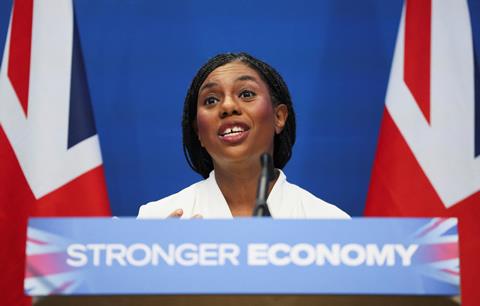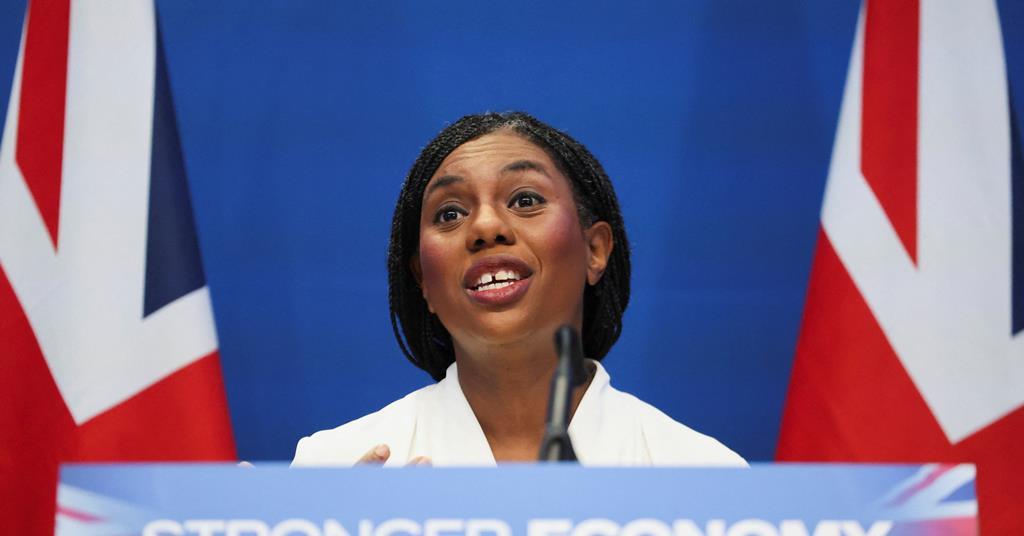Premier Christianity uses cookies Read our cookie policy.
By 2025-11-21T15:49:00+00:00
Those who cannot work do need looking after, says Miriam Cates. But the Bible does not say the government should do this. When we take that responsibility away from families, communities and churches, we weaken them rather than strengthen them
Source: Reuters
In her recent speech to the Conservative Christian Fellowship, party leader Kemi Badenoch told her audience that protecting the “responsibility and dignity of work” is a Christian imperative. Defending her party’s position that the welfare expenditure must be reduced, Badenoch referenced St Paul, saying “the first Epistle to Timothy proclaims that: ‘Anyone who does not provide for his own household… is worse than an unbeliever,’” (see 1 Timothy 5:8).
The speech ruffled feathers among some Christians. But what if Badenoch is right? Rather than dismissing her because she doesn’t share our faith – or rejecting her view on welfare because it sounds ‘unchristian’ – perhaps we should consider whether the Conservative leader has an important message for the Church about the proper – and improper – role of government.
The purpose of Paul’s letter to Timothy was to offer advice on church leadership, so his admonishment of the work-shy is directed at believers. But the direction to work and to provide for ourselves and our families is not only for Christians.
The very first command that God gives to all humanity is to work. “Be fruitful and increase in number; fill the earth and subdue it” (Genesis 1:28). Fruitfulness and increase are God’s plan for us all.
As welfare spending has boomed, family and the Church have declined
Work is also the first recorded act of God himself. And since human beings are made in God’s image, it stands to reason that we are made for work. This can take many different forms, and the type of work we’re capable of can depend on our age, sex, health, opportunity and circumstances. But no one – believer or unbeliever – is designed for idleness or dependency.
Of course, that does not mean that those who cannot do paid work should not be supported. The Bible is clear that widows, orphans and the sick should be looked after. The early Church was characterised by its counter-cultural care for the poor. Yet this biblical welfare model is one that is delivered through the family, community and the Church – not the state.
The Bible is clear about the role of government. According to 1 Peter 2:14 “governors…are sent by him to punish those who do wrong and to commend those who do right.” Romans 13:4 tells us that the authorities “are God’s servants, agents of wrath to bring punishment on the wrongdoer.”
The government’s primary role is to uphold the law. Of course, rulers should seek to prevent the vulnerable from being exploited – this was a requirement for Old Testament kings. Yet although the idea that the poor should be provided for is a biblical one, the belief that this must be done through state-enforced redistribution is not.
Our current welfare system demonstrates exactly why state provision is such a failure. The UK spends over £300bn a year on benefits. Yet, as a society, we have never been more lonely, sick or despairing. In removing the imperative for families, communities and the Church to provide and care for the vulnerable, we have robbed these institutions of their purpose and their power. It is no coincidence that, as welfare spending has boomed, family and the Church have declined.
No one – believer or unbeliever – is designed for idleness or dependency
The Centre for Social Justice has shown that many of those claiming benefits now have more income than full-time employees. Every day in Britain, 5,000 additional people are signed on to long-term sickness benefits, which is double the pre-pandemic number. This increase is the product of a system that disincentivises work.
Among lower income households, we have record levels of family breakdown – which is unsurprising when parents on universal credit can claim more money if they live apart. Through over-taxation, the welfare state punishes those who work hard, get married and have children, and rewards those who do not. This is the opposite of the proper role of government.
The only way to rebuild the family, community and the Church is to restore the need for them. Marriage, childbearing and strong communities were not meant to be a romantic ideal, a ‘nice to have’ once the state has done its job in providing us all with an income. Rather family and work – increase and fruitfulness – are an essential part of God’s plan for human flourishing.
By removing the link between work and provision, our bloated welfare state now discourages people from taking responsibility for their own families and neighbours. And too often the ‘care’ provided by the state is transactional, disembodied and lacking in real human compassion.
Kemi Badenoch is right to call for a reduction in welfare spending, and she has put her finger on an uncomfortable truth. Many in the Church have imbibed views about the role of the state that are deeply unbiblical.
I’ve lost count of the number of prayers I’ve heard said in church for politicians to “provide for the poor” or “end austerity”. Yet this is not the proper responsibility of the government. Rather it is the sacred duty of the Church, through sacrificial generosity and obedience to Christ, to answer the call to remember the poor.


Grab this Deal!
We’re celebrating a remarkable journey from our humble beginnings as Buzz in the 1960s to the vibrant, multi-platform publication we are today. One thing has remained constant: our commitment to connecting faith with the world around us. To celebrate our birthday, we are offering you a Print and Digital subscription for just £24 your first 12 months!
Subscribe Today
*Offer applies in UK only, but check here for our overseas offers
2025-10-02T08:50:00Z
An encounter with a nun in a Spanish cathedral has George Pitcher ruminating on a time of unprecedented tension – and what it means for Christians, Jews and Muslims to live together in peace
2025-09-26T12:10:00Z
The leader of Christians in Politics speaks out on division, polarisation and why following God’s call doesn’t mean meeting every need
2025-09-05T10:24:00Z
Bishops need to be more careful when talking about migration, says Rev Ian Paul. Loving your migrant neighbour does not mean avoiding the tough political questions
2025-11-21T17:05:00Z
A childhood encounter with The Lion, The Witch and The Wardrobe changed Michael Coren’s life long before he understood its Christian meaning. On the book’s 75th anniversary, he reflects on the enduring storytelling power of its famous author, C.S. Lewis
2025-11-21T14:59:00Z
Christian heavy metal bands are reaching countless people who would never step foot inside a church, argues London School of Theology’s Dr Daniel Johnson. You may not love their sound but you should be supporting Skillet’s evangelistic mission, he says
2025-11-21T14:29:00Z
A landmark Supreme Court ruling has declared Christian-focused religious education in Northern Ireland state schools unlawful, yet Peter Lynas says there are grounds for hope. The way we teach the faith may need to change, but our right to communicate the Gospel remains unhindered, he says
Site powered by Webvision Cloud

